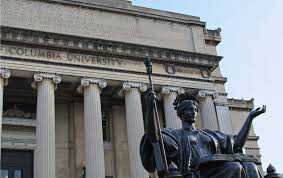The Cowardice of Elite

The Cowardice of Elites
At elite universities like Columbia and Stanford, student publications are starting to retract articles and anonymize authors, in particular those pieces “critical of Israel or Trump.” According to The Guardian, many writers are asking to have their work unpublished or leaving publications for “fear that their association with certain articles could jeopardize their safety or future career prospects.” Most takedown requests are coming from international students, but they “are coming from US citizens, too.”
I have sympathy for the international students. The threat to them is real. A Turkish student at Tufts University, Rümeysa Öztürk, was recently seized and whisked to a prison (“detention facility”) in Louisiana because she co-authored an op-ed criticizing the university’s response to student demands around Israel-Palestine. Every international student in the country is at serious risk. The Trump administration has been open about the fact that it doesn’t believe in due process, that even if you are in the country legally they believe they can deport you for speech that contradicts their foreign policy goals. They also believe they can defy court orders, hand you over to the dictator of El Salvador, and then tell the court that you’re now El Salvador’s problem. We just saw another incident this week: Columbia student Mohsen Mahdawi went for what he thought was a citizenship interview and ended up in handcuffs. A Russian research scientist, Kseniia Petrova, at Harvard has been jailed for eight weeks and threatened with deportation back to Russia (where, as a dissident, she would be in danger), because she didn’t fill out the right customs paperwork. It is therefore pragmatic for international students to be careful about expressing political opinions in public. I can’t criticize anyone for safeguarding their liberty.
I feel differently, however, about the U.S. citizens who are pulling their pieces, or those who are doing so because their “future career prospects” are at risk. Being in fear of prison and deportation is one thing. Being in fear of losing a job at McKinsey is quite another. U.S. citizen students at Stanford and Columbia are some of the most privileged people in the world. They may have something to lose. But right now they can afford to take more risks, and with the protection that comes from citizenship comes an obligation to speak and act, precisely because our immigrant friends are having to self-censor.
Speech that's critical of Trump or of Israel carries risks. I once lost a columnist position because I tweeted a joke critical of U.S. military aid to Israel. I’ve never had a job at a prestigious outlet since. My colleague Briahna Joy Gray, whose “radars” on the show Rising were some of the most critical of Israel that you’d find among mainstream political commentators, also lost her job. And the list goes on: Katie Halper, Marc Lamont Hill, Joy Reid, and others critical of Israel have all lost jobs. Well, what are we going to do, not criticize U.S. military aid to a major human rights abuser or the Israeli destruction of Gaza? I interviewed an American doctor recently who has repeatedly risked his life trying to save Gazan children from horrendous injuries. He’s not Palestinian, he just takes seriously his obligation to save lives. I think about the risks he was prepared to take and find myself having little respect for those who keep quiet over Palestine and Trump out of concern for “future career prospects.”
Just look at the elite law firms making their craven deals with Donald Trump. Trump has threatened them with federal investigations because they have opposed him, and many of them have instantly licked his boots, offering him hundreds of millions of dollars in pro bono services for his pet causes. Or look at all the corporations rolling back their DEI policies just to appease the president. Of course, we don’t expect much of corporations or rich lawyers. Business leaders are, after all, essentially obligated to look out for their bottom lines above all. They embraced Black Lives Matter when the movement was popular. They ditched it when the conservative backlash came to power. That’s to be expected.
We should expect better of universities, though. Unfortunately, many of them have been just as craven. Columbia, for instance, simply complied when Trump issued a spate of (totally unacceptable) demands, including taking control of the Middle Eastern studies department away from the faculty. Some were surprised that Columbia didn’t fight
Trump’s demands harder. It had a pretty strong legal case that Trump’s actions were unconstitutional, but the university chose not to take on Trump in court. But the decision is more explicable when we understand how the corporatization of the university has meant that values like intellectual independence are subordinated to prestige and money-making. Before Columbia rolled over, Palestinian American professor Rashid Khalidi said of it and other elite schools that “I have been both disgusted and horrified by the way higher education has developed into a cash register – essentially a money-making, MBA, lawyer-run, hedge fund-cum-real estate operation, with a minor sideline in education, where money has determined everything, where respect for pedagogy is at a minimum.” Is it any surprise that such a university would have little interest in waging a battle for free speech and academic integrity?
We might therefore be pleasantly surprised that Harvard has recently shown a bit of backbone. Harvard was sent a set of demands by the Trump administration which included both the elimination of affirmative action for people of color and the introduction of affirmative action for conservatives. (They call this “viewpoint diversity” and lay out specific steps they wish Harvard to take that would guarantee a greater number of conservative professors.) Harvard responded with a public refusal and a lawsuit. Good. The Trump administration has now frozen billions of dollars in federal grants to Harvard.
But we’ll see how Harvard responds as Trump (inevitably) escalates the pressure, and we can’t rely on an elite university to show much principle. Already, they’ve shown worrying signs of capitulating. Kseniia Petrova, a Harvard research scientist, has been in immigration jail for weeks because she didn’t fill out customs paperwork properly for lab samples she was transporting, and the university “has made little comment” about her detention, saying only that the university “is closely following the rapidly shifting immigration policy landscape and the implications for its international scholars and students.” Marina Sakharov-Liberman, granddaughter of Soviet dissident Andrei Sakharov, told the New York Times that it was “extraordinary” that “Harvard had not more publicly protested Ms. Petrova’s detention and demanded her release,” saying it was a kind of timidity she’d expect in Russia. We’ve seen a worrying lack of support for students from universities as they have been targeted by the federal government. Mahdawi, for instance, “asked [Columbia] administrators to help him find a safe place to live so he would not be taken by ICE agents” but “the school did nothing.” Mahmoud Khalil, too, had asked for university support before his arrest and received none. Asked by the press to react to Mahdawi’s arrest, Columbia “declined to comment, citing federal student privacy regulations,” an entirely bogus excuse, since nothing in “federal student privacy regulations” would prohibit making a general statement condemning Trump’s crackdown and promising full support to students who are victimized by it.
The Trump administration has already revoked over 600 student visas, many plainly because of student political speech. Instead of publicly fighting for their students, some universities have simply been silent. Consider the University of Illinois, where dozens of students are having visas revoked but the university offered only boilerplate bullshit in its public commentary, saying “we are working directly with affected students to help them connect with appropriate resources and understand their options.” Southern Illinois University professor Jyotsna Kapur was more admirably forthright, saying “What is deeply distressing about the news—that an international student’s visa was revoked—is the chilling silence around it, which only adds to the sense that we are powerless in the face of multiple attacks on the very existence of universities as places of learning, questioning and nurturing the next generation.” If only the institutions themselves would be as direct as Kapur!
Comments
You must be logged in to comment.
Latest Articals
-
Why Mental Health Support Is Essential for Long-Term Wellness
Long-term wellness is not only about physical fitness or the absence of illness; it also depends heavily on emotional stability and psychological balance. In today’s fast-paced world, people face constant pressures from work, relationships, finances, and social expectations. Without proper support, these pressures can slowly affect emotional health. Access to Mental Health Resources plays a vital role in helping individuals manage challenges, maintain balance, and build a healthier future.Understanding Emotional Well-Being and Its ImportanceEmotional well-being influences how people think, feel, and respond to everyday situations. When mental health is neglected, even small problems can feel overwhelming. Over time, unmanaged stress and emotional strain may lead to anxiety, burnout, or persistent low mood. Recognizing emotional needs early allows individuals to take proactive steps before issues become deeply rooted.Support systems focused on mental health help people understand their emotions, develop self-awareness, and respond to life’s challenges more effectively. These systems are not...
-

Your Go-To Commercial & Residential Plumbing Experts in Conyers – tksons
Plumbing is one of those essential systems that often goes unnoticed—until something goes wrong. From unexpected leaks to major system failures, plumbing issues can disrupt both homes and businesses in an instant. That’s why having experienced commercial plumbing contractors in Conyers and dependable residential plumbing services in Conyers is crucial. tksons has become a trusted name in the Conyers area by delivering reliable, efficient, and long-lasting plumbing solutions for every type of property.Comprehensive Commercial Plumbing Services in ConyersCommercial plumbing requires precision, experience, and a deep understanding of complex systems. Businesses depend on properly functioning plumbing to maintain hygiene, safety, and daily operations. As leading commercial plumbing contractors in Conyers, tksons provides tailored plumbing services for offices, retail stores, restaurants, apartment complexes, and industrial facilities.Our commercial services include pipe installation and repair, water supply line management, drainage and sewer services, restroom plumbing, and preventive maintenance programs. We understand that downtime can be costly, so our team works efficiently...
-

Expert Electrician in Buckhead Offering Safe & Modern Electrical Solutions | mccelec
Electrical systems play a crucial role in keeping homes and businesses safe, functional, and efficient. From powering daily activities to supporting advanced technology, reliable electrical work is essential. If you’re searching for professional electrical services in Buckhead, mccelec is your trusted local choice, delivering dependable solutions backed by experience, safety, and quality workmanship.The Importance of Hiring a Qualified Electrician in BuckheadElectrical issues are not just inconvenient—they can be dangerous if handled improperly. Faulty wiring, overloaded circuits, or outdated panels can increase the risk of fires, power failures, and equipment damage. Hiring a certified electrician Buckhead property owners trust ensures that every job is completed according to safety standards and local electrical codes.With mccelec, you get skilled electricians who understand the complexities of modern electrical systems and provide solutions that are both effective and long-lasting.Complete Residential Electrical Services in BuckheadYour home’s electrical system should be safe, reliable, and designed to meet your lifestyle needs. mccelec offers comprehensive...
-

Best Computer Academy in Jaipur – Learn Skills That Build Your Career
In today’s digital world, computer education is no longer optional—it is a necessity. Whether you are a student, job seeker, or working professional, learning the right computer skills can open many doors. Jaipur has become a growing hub for quality education, and choosing the right institute can make a big difference in your future.If you are searching for the best computer academy in Jaipur, best training center in Jaipur, or best coaching institute in Jaipur, this blog will guide you clearly and honestly.Best Computer Academy in JaipurWhen students search for the Best Computer Academy in Jaipur, they look for quality education, practical training, and career support. A good computer academy should focus on real-world skills, updated courses, and experienced trainers.GPS Computer Academy, Jaipur stands out because it offers AI-Powered Education and Training designed for today’s competitive world. The academy focuses on helping students understand concepts easily and apply them practically....
-
.jpeg)
Adult Orthodontic Options for Healthier, Aligned Smiles in Sea Girt, NJ
Adult orthodontic treatment has become an increasingly popular choice for improving both dental health and appearance. At Your Dentalist in Sea Girt, NJ, adults have access to modern orthodontic options designed for comfort, discretion, and efficiency. Straighter teeth are not only about aesthetics but also about maintaining long-term oral health.Many adults seek orthodontic care to correct shifting teeth, bite problems, or alignment concerns that were never treated earlier. With today’s advanced solutions, achieving a healthy, aligned smile is more accessible than ever. Why Adults Choose Orthodontic TreatmentAdult orthodontic care addresses issues that can affect daily comfort and dental health. Misaligned teeth may contribute to uneven wear, jaw discomfort, and difficulty cleaning certain areas. Orthodontic treatment helps correct these problems and supports overall oral function.Beyond health benefits, orthodontic care enhances confidence. A well-aligned smile often improves personal and professional interactions. Common Orthodontic Concerns in AdultsAdult patients often experience dental changes over...
-

How AI-Powered Link Building Is Replacing Traditional SEO Outreach
For years, link building meant endless emails, uncertain replies, and backlinks that didn’t always improve rankings. In 2026, that model is breaking fast. Businesses now want clarity, control, and competitive data—not guesswork.This shift has pushed SEO teams toward intelligent platforms that combine link building services, link building marketplaces, and SEO link building services into one streamlined workflow. Vefogix sits right at the center of this evolution.Link Building Services: Moving Beyond Random BacklinksLink building services are designed to help websites earn authoritative backlinks that improve search visibility. But modern SEO demands more than simple link placement.Outdated services often:Focus on quantity instead of relevanceHide publisher detailsProvide links without performance insightsToday’s link building services are strategy-driven, guided by competitor data and real-world results.How Vefogix Redefines Link Building ServicesVefogix applies AI to the entire link-building process:Identifies backlink sources already working for competitorsHighlights trusted, niche-relevant websitesEliminates risky or low-value domainsGives full transparency before you investThis...